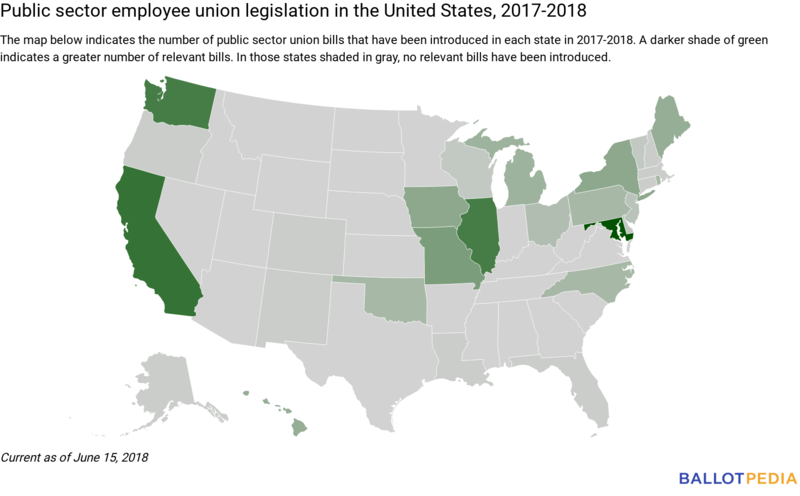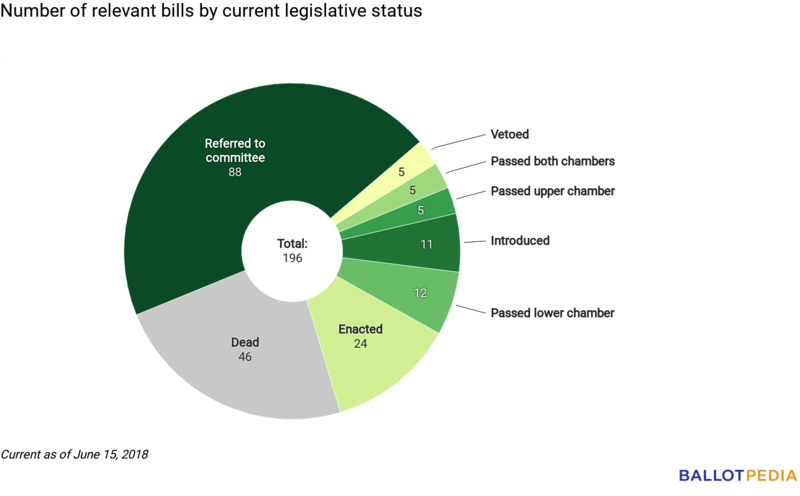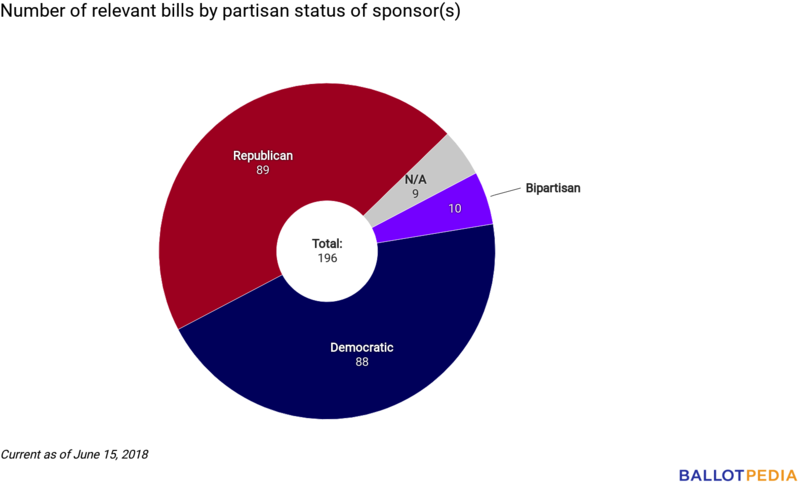Union Station: June 15, 2018
The Supreme Court of the United States has not yet issued a decision in Janus v. American Federation of State, County, and Municipal Employees (Janus v. AFSCME), a case challenging the constitutionality of public sector employee union agency fees (i.e., fees required of non-members to cover the costs of non-political union activities). The next opinion release dates are June 18, 2018, and June 25, 2018.
In anticipation of this ruling, state legislatures have begun considering bills relating to public sector employee unions. In this newsletter, Ballotpedia will track those bills, highlight national legislative trends, and provide a sampling of commentary surrounding the subject.
What people are saying
In opposition to Janus:
| “ | No one likes free riders who are happy to join in when others are buying the drinks but never buy a round themselves. We know that if we want the fire department available when our homes catch fire, we have to pay our fair share of the cost of keeping the fire department running. Ideally, everyone would pay voluntarily but, because we know that some people will be tempted to free ride, we have legal rules requiring every neighbor to pay their fair share.
For the past 40 years, 'fair share' rules were applied to public workers and their unions. The courts decided in 1977 that if public sector workers didn’t want to be members of the union, they could stop paying the part of union dues that covered the costs of broader union activities, but they should at least pay 'fair share' fees covering the costs of negotiating contracts and representing them in disputes with employers.[1] |
” |
| —Peter Evans, retired public sector educator, in an op-ed for The Santa Fe New Mexican (June 9, 2018) | ||
In favor of Janus:
| “ | The truth is, unions are openly and intrinsically political. They spend large amounts of money through their PACs, and they use this leverage at the bargaining table - not to mention everything they bargain over is inherently political because it involves the use of taxpayer money.
Even if you disregard these facts, the numbers don’t lie. Government unions frequently spend more of their members’ dues on politics and lobbying than they do on representing their members. … What’s more, unions also blur the lines between what is 'political' and what is 'representational,' categorizing things that are inherently political as representational to hide political spending. ... If you follow the money, one thing becomes painfully clear: Government unions artificially distort the American political landscape.[1] |
” |
| —Mailee Smith, policy attorney for the Illinois Policy Institute, in an op-ed for The Tribune News Service (June 13, 2018) | ||
What we've been reading
Below is a sampling of the news articles and commentary relating to public sector unions that we've been reading:
- Vox, "The Supreme Court case that could kneecap public sector unions, explained," June 14, 2018
- Yankee Institute for Public Policy, "Connecticut unions brace for Supreme Court decision with protests, membership changes," June 13, 2018
- The Oregonian, "Will pending Supreme Court decision weaken unions' political power in Oregon?" June 13, 2018
- The 74, "Labor in the Age of Janus: 6 Things to Keep in Mind About American Unions on the Eve of a Pivotal Supreme Court Ruling," June 13, 2018
- The Washington Post, " Supreme Court likely to oppose unions that represent teachers, other public sector workers. Here’s why that matters." June 12, 2018
The big picture
Number of relevant bills by state
As of June 15, 2018, we are tracking 196 pieces of legislation dealing with public sector employee union policy. Compared with last week, we are tracking three additional bills (two from California, and one from Delaware). Click the map for complete information.
Number of relevant bills by current legislative status
Number of relevant bills by partisan status of sponsor(s)
Recent legislative actions
Since last week, the following major legislative actions occurred:
- One new bill was introduced:
- Delaware: HB464 (see full description below)
Below is a complete list of legislative action on relevant bills in the past week. Bills are listed in alphabetical order, first by state and then by bill number. Because some state bill tracking systems are not updated in real time, some action may have occurred more than a week ago.
- California AB1832: This bill would extend public sector union provisions to employees of the Regents of the University of California, the Judicial Council, counties, cities, and public authorities, authorizing unions to request payroll deductions for employee fees and dues. This bill is similar to other bills pending before the legislature, but it is not a formal companion those bills.
- This bill will be heard by the Senate Budget and Fiscal Review Committee on June 18, 2018. The bill cleared the Assembly on May 10, 2018.
- California AB1937: This bill would extend public sector union provisions to employees of the Regents of the University of California, the Judicial Council, counties, cities, and public authorities, authorizing unions to request payroll deductions for employee fees and dues. This bill is similar to other bills pending before the legislature, but it is not a formal companion those bills.
- This bill will be heard by the Senate Public Employment and Retirement Committee on June 25, 2018.
- California AB2049: This bill would authorize school districts and community colleges to rely on labor unions when determining whether a request to discontinue payroll deductions for union dues is in conformity with the requirements established in the initial payroll deduction authorization.
- This bill will be heard by the Senate Public Employment and Retirement Committee on June 25, 2018.
- California AB2886: This bill would require employers and employees of the Orange County Transit District to "adjudicate complaints of specified labor violations" before the Public Employment Relations Board.
- This bill will be heard by the Senate Judiciary Committee on June 26, 2018. The bill cleared the Assembly on May 10, 2018.
- California SB866: This bill would extend public sector union provisions to employees of the Regents of the University of California, the Judicial Council, counties, cities, and public authorities, authorizing unions to request payroll deductions for employee fees and dues. This bill is similar to other bills pending before the legislature, but it is not a formal companion those bills.
- On June 13, 2018, the bill was amended by its author and re-referred to the Budget Committee.
- Delaware HB464: This bill would require public employers to release information about employees to recognized union representatives.
- This bill was introduced in the House on June 14, 2018. It was referred House Labor Committee.
- Rhode Island H7377: This bill would authorize municipal police unions to refrain from representing employees in grievance/arbitration proceedings if those employees were not members of the collective bargaining unit within 90 days of the event precipitating grievance/arbitration proceedings.
- On June 7, 2018, the bill was referred to the Senate Labor Committee. The legislation cleared the House on June 5, 2018.
- Rhode Island S2158: This bill, which is similar to H7377, would authorize municipal police unions to refrain from representing employees in grievance/arbitration proceedings if those employees were not members of the collective bargaining unit within 90 days of the event precipitating grievance/arbitration proceedings.
- On June 13, 2018, the Senate Labor Committee recommended that a substitute version of the bill be passed.
See also
| |||||||||||||||||||||||





